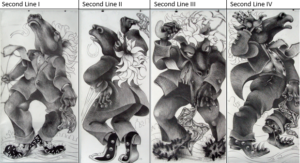Each time a supporting faculty member visits class, I am given more and more tools that allow me to better analyze both Prince’s work and the assigned class readings. Additionally, the contributions of the supporting faculty members grant me different perspectives and ideas that nearly beg to be connected with the art of Steve Prince or with the works of W.E.B. Dubois and Kim Vaz-Deville, the authors of the class’ required readings.
Dr. Cope’s lecture, in particular, not only provided me with such tools but left my mind buzzing with many thoughts and questions, as well. Specifically, I found myself considering and condemning the concept of Providence that Dr. Cope discussed throughout his lecture. I began to think about the idea, both with reference to the Puritans and their definition and manipulation of the word and its application to today’s society, as well. Since the lecture, I have been seeking connections between the Puritan, and even contemporary, idea of Providence and the Art of Steve Prince class as a whole.

